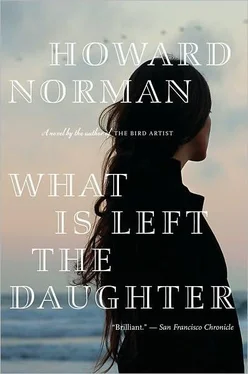See, when 49th Parallel begins, the camera zooms in on a map of Canada, and then the St. Lawrence River looms large, and then we see U-37 cut the surface, sinister as all hell. While it cruises along, the captain tries to work up historical gloating and excitement — of a Nazi sort — in his crew. "You'll be the first of the German forces to set foot on Canadian soil. The first of thousands."
Yet if you study the black-and-white photograph in Rigolo's, you'll see three men in their early twenties standing at the bar having a grand old time, all happy-go-lucky and clinking mugs. They have fishermen's caps on. They are wearing thick fishermen's sweaters and looking directly into the camera. What's more, someone — the photographer, maybe, or the pub owner — has circled the face of the man in the absolute bull's-eye center of the photograph, his big round face, dimples, strong chin and eyes heavy-lidded from drink.
A line runs in ink from the circle down to the lower right hand corner of the photograph, where these words are written: Nazi U-boat navigator Wernor Timm, U-69, the Laughing Cow, October 12, 1939. You'll remember, Marlais, the Laughing Cow had sunk the ferry Caribou, on which Constance had been a passenger.
I learned from the newspapers that before the successful crackdown on U-boats — before thick-link fences were submerged in the harbor — the German crews used to anchor offshore (some people said near Peggy's Cove) and make their way into Halifax. They went to pubs, movies and restaurants, telling everyone they were Swedes off a Swedish freighter, or Norwegians, or some such lie.
As it happened, this Wernor Timm had stepped out some nights with a Haligonian named Wilma Raymond. People had seen them together, but nobody would ever have known Timm's true identity except for the fact that on their last night together, Timm got drunk and told Wilma everything. He even proposed marriage! She refused him, and as she later said, "He stumbled out of my apartment and just disappeared into the streets."
Wilma Raymond was the niece of the bartender at Rigolo's Pub. She was horrified to discover the photograph her uncle had put up behind the bar. There was Wernor Timm, big as life! She was so ashamed of having consorted with a German U-boat officer it took her another few days to work up the courage to tell her uncle what she knew. Of course by that time the Laughing Cow was long gone.
Once he knew the facts, Wilma's uncle wrote Timm's name and rank on the photograph. Soon word got out that a U-boat navigator had come and gone undetected, and this sent a current of anxiety through the city. The photograph was reproduced on the front page of the Mail. Pub owners now asked for identification before serving customers, except for those they were already familiar with. The newspaper said that Wilma Raymond left Halifax "to visit relatives in Saskatchewan." I bet she did.
Well, if only the poster slogan "Loose lips sink ships" would have worked in reverse, and the Laughing Cow had been ambushed at Peggy's Cove because of what Wernor Timm had revealed to Wilma Raymond, it would not have been in commission three years later, to sink the Caribou, and my aunt Constance might still be alive. Those were my thoughts after reading the whole account.
Anyway, there it was, a photograph proving the German military was on Canadian soil in 1939. I was in Rigolo's Pub just last week and saw the photograph again. It's by now an historical document of sorts, you might say.
But you have to look closely, quite closely, to notice who's standing at the far right end of the bar — Hans Mohring. Hans is deep in conversation with a man and a woman, probably students. It would've been his first semester at Dalhousie. Hans is holding a cigarette, and the woman has a cigarette dangling from her mouth.
After the movie, Cornelia and I sat in the small cafe-restaurant in the Dresden Arms Hotel and had tea, and she ate her last three bonbons from the cinema. "I've brought recent photographs Tilda sent of Marlais," she said. She pushed a manila envelope across the table. I slid the photographs out and there you were, Marlais! All of age seven, sitting at an outdoor table with five other children. There was a birthday cake on the table, and the birthday girl was blowing out the candles. You sat at the right side of the table, all dressed up, with your hair frizzed out like your mother's and a big smile and soulful expression on your face, like you were having a deep thought. The party looked like loads of fun.
In the second photograph you were standing alone with the sea in the background. On your right wrist you wore a bracelet made of paper angels. Maybe each of the girls invited to the party got one.
"You should go to Denmark, Wyatt," Cornelia said. "Why haven't you?"
"I can't afford the travel, but I put money away for Marlais every month. She has her own bank account in Halifax waiting for her. The money's there whenever she needs it, even if she needs it wired to Copenhagen. Tilda knows this."
"Generous, Wyatt, but not as important as visiting."
"It's how life's turned out."
"And you didn't help it turn out the way it did, right?"
"Okay, I have your opinion now, Cornelia. Maybe you'd care to tell me what Tilda includes in her letters to you, generally speaking."
"This and that. Mostly news of Marlais, her school, her friends, what it's like to live with the Mohrings, what it's been like in Denmark after the war, this and that. She writes well, Tilda does, and always has."
"Tilda and I don't exchange letters. She's never sent me one and I've never sent her one."
"If everyone keeps waiting for the other, no letters will ever arrive, eh?"
"That's proven true so far."
"It's very stupid of you both. In fact, it's the goddamned stupidest, most selfish thing I've ever heard two people with a daughter doing."
We sat for a moment looking out onto the street, and then I said, "Are Marlais and Tilda happy, do you think?"
"Let me put it this way," Cornelia said. "In her letters she refers to intimate things but doesn't describe things intimately. Something like that. As for happy? It sure sounds as if Marlais is having everything good offered by a Danish childhood, which isn't a Nova Scotia childhood, but who knows, maybe it's second best in the world. That's not too shabby. And if Marlais is having a wonderful childhood, then it only stands to reason Tilda is happy about that, right?"
"Something else, Cornelia. I haven't written one single letter to my uncle, either. I haven't been to visit him. And the truth? I don't want to visit him."
"I've been only twice. And my visits were three years apart. But do you know what Donald's doing in Dorchester Prison? They've got a wood shop there. And he's making sleds. I don't think toboggans, but definitely sleds, because he gave me one. I brought it back on the bus. It's upstairs from the bakery, on the floor of what formerly was Tilda and Hans's kitchen. Donald asked that I ship it on to Marlais. He seemed to have no sane idea what he was asking — no idea how much Tilda would despise getting that sled from him."
"I'm sure Reverend Witt — is he still reverend?"
"Till he drops dead at the pulpit."
"I'm sure he can find someone who'd like that sled. He doesn't have to say who built it."
"Good idea. I'll suggest it first thing when I get home."
We talked and talked, and I happened to mention the photograph in Rigolo's Pub, and right away Cornelia said she wanted to see it. "I've never stepped inside a pub in Halifax, not once," she said.
We walked to Rigolo's and stood at the bar where we had a clear view of the photograph. I ordered a beer and Cornelia a cognac, which she said she didn't really care for, but thought since she was in a pub she should order something exotic. However, she was so taken aback by the photograph, so disturbed by it, she not only gulped down the first cognac but had a second straightaway.
Читать дальше












